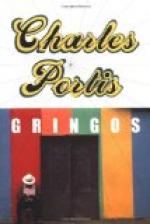The saints were kind to Valencia, but they were also grimly just. Because he so greatly desired an excuse for delay, they tricked Noches with a broken willow branch that in the deceptive moonlight appeared to be but the shadow of the branch above it. It caught him just under an outflung knee as he galloped and flipped him neatly, heels to the stars. He did not struggle to his feet even when Valencia himself, a bit dazed by the fall, pulled upon the reins and called to him to rise. The horse lay inert, a steaming, black mass in the road. The moon was sliding down behind the Santa Cruz Mountains, and the chill breeze whispered that dawn was coming fast upon the trail of the moonbeams.
Valencia, when he saw that Noches would never gallop again, because he had managed to break his sweat-lathered neck in the fall, sat down beside the trail and rolled a corn-husk cigarette. His mood swung from regret over the passing of as fleet and true a horse as ever he bestrode, to gratitude to the saints for their timely hindrance of his prompt delivery of the note. Truly it was now no fault of his that he could never reach the hacienda before Manuel! He would have to walk and carry his saddle, heavy with silver and wide skirts of stamped leather; and he was a long way from the end of his journey, when he must cover the distance with his own feet. Eight or ten miles, he estimated it roughly; for he had passed Jose’s hacienda some time before, and had resisted the temptation to turn aside and find out if Manuel were there or had gone on. He had not passed Manuel in the trail as he had boasted that he would do, and not once had he glimpsed him anywhere, though there had been places where the road lay straight, and he could see it clear in the moonlight for a mile or more.
When he had finished the cigarette and his thanks to Fate—or whatever power had delayed him—he removed his saddle and bridle from the horse and went on; and it was then that he began to understand that he must do a penance for desiring war rather than peace amongst his fellows. Valencia, after the first hour of tramping with his saddle on his shoulders, had lost a good deal of his enthusiasm for the duel he felt sure was already a certainty.
When he left the road for a straight cut to the hacienda, the wild range cattle hindered him with their curiosity, so that, using all the methods known to a seasoned vaquero for driving them back, his progress had been slow. But he finally came out into the road again and was plodding along the stone wall within half a mile of the house, his face very disconsolate because of his protesting feet and the emptiness in his stomach, when Manuel himself confronted him suddenly coming from the house.
Manuel was looking well pleased with himself, in spite of his night ride. He pulled up and stared wide-eyed at Valencia, who had no smile with which to greet him but swore instead a pensive oath.
“Dios! Is it for a wager that you travel thus?” grinned Manuel, abominably comfortable upon a great, sorrel horse that pranced all round Valencia in its anxiety to be upon its way home. “Look you, Valencia! Since you are travelling, you had best go and tell the padres to make ready the sacrament for your gringo friend, that blue-eyed one; for truly his time on earth is short!”




